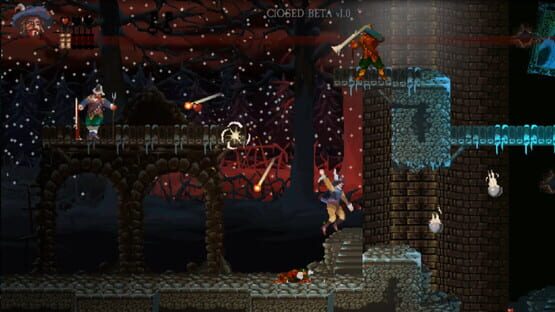

Black magic in the age of pike and shot! Reload your musket after every blast in “Heidelberg 1693”, a challenging 2D action adventure set in a dark and twisted vision of Germany in the late 17th century.
Released on
Genres
Reviews View More
Very interesting take on brutally-difficult action-platforming, in the vein of games like Castlevania or Shinobi. There's a degree of randomness in its design however – primarily with the skull ghost enemies that love to hinder your progress in several different ways. Because their appearances and behavior are both randomized, it means that there's potential for them to either make the moment-to-moment gameplay more exciting, or potential for them to ruin your current attempt at a stage, due to no fault of your own. This is probably the weakest thing about the game, and it's a shame that parts of the game don't quite hold up as being satisfying to get the hang of as a result. It seems a bit antithetical to this type of deliberate action-platformer, but it's an interesting experiment, I suppose.
I do really like the musket – it functions as a ranged weapon which is very powerful, but can only be fired once, before you need to initiate a lengthy reload animation to use it again. You also can attack with a sword at any time, but that's limited to melee range. So, the decision you have to make at any given time, of which attack to use and when, as well as figuring out when you can safely reload, is pretty exciting. You also generally have a good sense of weight to your momentum as you jump and run around, so the platforming is pretty satisfying.
All in all – it's a neat effort, and I generally like it, but there's room for improvement.
I do really like the musket – it functions as a ranged weapon which is very powerful, but can only be fired once, before you need to initiate a lengthy reload animation to use it again. You also can attack with a sword at any time, but that's limited to melee range. So, the decision you have to make at any given time, of which attack to use and when, as well as figuring out when you can safely reload, is pretty exciting. You also generally have a good sense of weight to your momentum as you jump and run around, so the platforming is pretty satisfying.
All in all – it's a neat effort, and I generally like it, but there's room for improvement.
Ricorda platformer come Claw, ma a differenza di giochi come quello citato è abbastanza anonimo e il platforming è ancora di più ridotto all'osso. Presenti delle sub-weapon, generalmente molto simili a quelle nei Castlevania (menzionano la loro esperienza con Super Castlevania 4). Il gioco si differenzia in particolare per la possibilità di utilizzare un moschetto (da ricaricare a ogni proiettile sparato) e per la presenza del fuoco amico: grazie a quest'ultimo è possibile lasciare che i nemici presenti davanti a sé si scannino tra di loro, senza dover necessariamente intervenire; inoltre, sono presenti dei trigger colorati di rosso con i quali è possibile far spawnare nuovi nemici su schermo. A detta degli sviluppatori, per questa scelta di design si sono ispirati alla filosofia determinista del 1700. Secondo me, è na strunzat.
Carini i fondali, non altrettanto la OST effettivamente noiosa o atroce a seconda del caso.
La morte, almeno, non è punitiva già che i checkpoint sono frequenti.
Carini i fondali, non altrettanto la OST effettivamente noiosa o atroce a seconda del caso.
La morte, almeno, non è punitiva già che i checkpoint sono frequenti.
